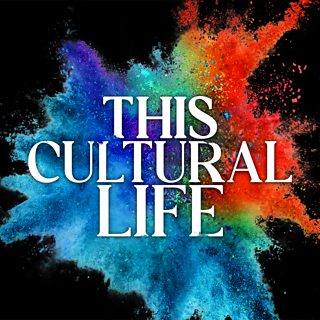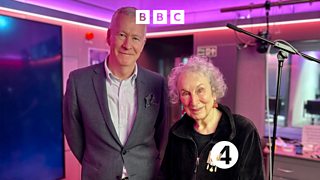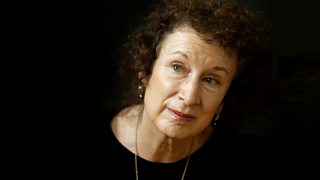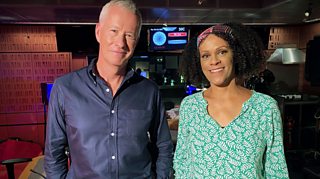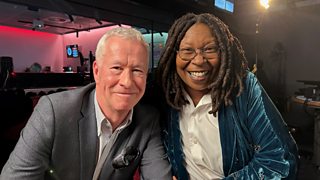Margaret Atwood: Nine things we learned from her This Cultural Life interview
Margaret Atwood is one of the world’s bestselling authors. She’s published more than 60 books, including the dystopian classic The Handmaid’s Tale, and won the Booker Prize twice, first in 2000 for The Blind Assassin, then in 2019 for The Testaments, her sequel to The Handmaid’s Tale. Now 83, she is still writing, recently publishing a new collection of short stories, Old Babes In The Woods. Interviewer John Wilson welcomes Atwood to This Cultural Life to discuss writing her first novel at seven, the origins of her fascination with dictators, and why she used to be terrified of flushing toilets. Here are nine things we learned.
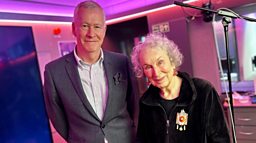
1. She grew up in the woods
Atwood was raised in rural Quebec, Canada. She says to adjust your ideas of what “rural” means: “We’re not talking farms, we’re talking wolves”. Her father was a forest entomologist and her mother a dietician. She says it was a very free upbringing. “They allowed us to make messes in our rooms and didn’t make us clean them up,” she says. “By messes I mean projects, which always begin as messes.” She and her brother would make models, paint, write and sew. Her childhood was so removed from standard suburban life that some things that were normal to others were alien to her. “What was frightening to me as a small child? Flush toilets,” she says. “Things went down them and never came back.”
2. She could read very early
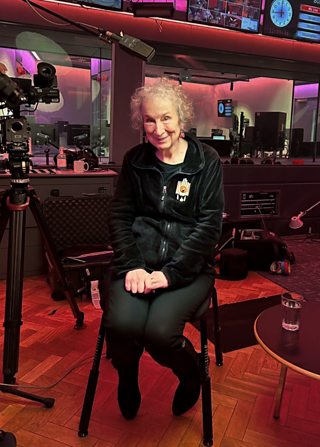
Most of Atwood’s schooling was done at home. It wasn’t until she was 12 that she regularly went to school, although she’d go off and on before that. When Atwood first went to school, she was much more advanced than the other children in certain areas. “I could read and they couldn’t,” she says. “There’s not much to do up there [in the woods] and I had to learn to read so that I could read the funnies – the comic strips – in the newspaper, because nobody else would read them to me.”
3. She wrote her first book at seven
Atwood says her brother was the big writer in the family. Three years older than her, he wrote a number of books between the ages of seven and nine. “He was very prolific,” she says. “They were adventure stories. Illustrated. At the beginning, they all concerned his imaginary world, which was at war constantly, because of course it was the war.” Atwood was born two months after the beginning of the Second World War. Though her brother was first, Atwood wrote her first novel at seven too. “It was about an ant,” she says. The ant was named Annie. “It was a good lesson in how not to [write a book]. Ants don’t do much for the first three quarters of their life. Eggs do nothing. Larvae do nothing. It was quite inert at the beginning.”
4. She believes the first five pages are the most important
Whenever she’s asked for advice by young writers, Atwood says, “I only look at the first five pages… If you can’t get the reader past the first five pages, your beautiful theory of truth and beauty on page 76, they will never read because they won’t keep going. Hook me in. Present me with a mystery. Make me want to know more. That’s a good beginning of a book. ‘It was the best of times, it was the worst of times.’ Oh, tell me more! In what way? ‘Call me Ishmael?’ Why should I call you Ishmael and who are you talking to? ‘The past is another country and everything is different there?’ How differently? Tell me more!”
5. She once put on cannibalistic puppet shows
Atwood says that when she was at school, girls were offered five career choices: teacher, nurse, air stewardess, secretary and home economist (or cook). She took home economics because “I was a mercenary little child… and that paid the most money.” She wishes she’d studied secretarial skills because she still can’t touch-type. Her first job had nothing to do with any of those five areas. While still at school she made money doing puppet shows at children’s parties: “All the plots were about cannibalism, which is what children of that age like… Three Little Pigs: cannibalism. Little Red Riding Hood: cannibalism. Hansel and Gretel: also cannibalism."
6. She’s always been fascinated by dictators
One of the things that has occupied me really quite a lot over time is how do these dictatorships get going? And how do they maintain themselves and then fall apart?Margaret Atwood
The Handmaid’s Tale, Atwood’s most famous work, takes place in a world where a dictatorial regime has taken power and women are treated as state property. Atwood says she’s always been interested in dictators, which she puts down to being born during wartime. “One of the things that has occupied me really quite a lot over time is how do these dictatorships get going? And how do they maintain themselves and then fall apart?” That theme occurs in two books that were big influences on her: Animal Farm and 1984. “It had a huge impact,” she says of 1984. “My first reaction to it was the one that everybody has, which is that it’s a very gloomy book and very pessimistic. But thinking about it later, I realised that [George Orwell had] put this coda at the end and it’s a very hopeful thing because it’s an essay on newspeak (the government language in the book), written in standard English, in the past tense. So the message is that it ended.” That inspired The Handmaid’s Tale, which also ends with someone looking back on the dictatorship after its fall.

7. A Handmaid’s Tale was inspired by the Reagan presidency
You can see it in action now... It's what the right wing wants. It wants a hierarchical Puritan theocracy.Margaret Atwood
A Handmaid’s Tale was written in 1984 – “Isn’t that corny?” – when Atwood was living in Berlin. It was inspired by the presidency of Ronald Reagan in 1980. “There was a big pushback against what had happened in the 70s, especially when it came to women’s rights,” she says. “The 70s were quite expansionist – you could have your own credit card and stuff like that. Then you got this pushback. That was when they started activating the evangelical religious right as a political force.” It was also informed by her graduate studies of American Puritanism. “You can see it in action now,” she says. “It's what the right wing wants. It wants a hierarchical Puritan theocracy.”
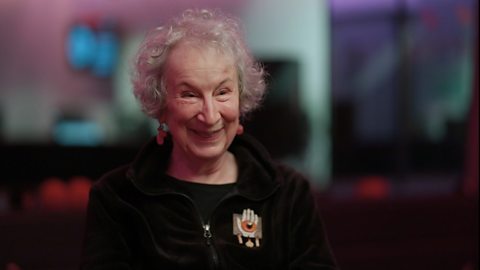
Margaret Atwood's opera
The writer sings a song she wrote about man-made fabrics for a school project.
8. One of her ancestors was (half) hanged for being a witch
On the subject of American Puritans, Atwood mentions that she’s allowed to be mean about them because they’re family. “I get to say bad things about these people because they are my ancestors,” she says. One of her ancestors was Mary Webster, who was hanged for witchcraft in the 1600s. Well, almost hanged. “They didn’t succeed in hanging her and that’s why it’s interesting,” she says. “She’s called Half-Hanged Mary. They tried to hang her, but they hadn’t invented the drop. They just kind of strung her up. She must have had either a very tough neck or been very light, because they did not succeed.”
9. She’s not surprised The Handmaid’s Tale is still relevant
It’s often said that The Handmaid’s Tale has found new relevance today, which is something that doesn’t surprise Atwood. “It had periods of not being so relevant,” she says. “The 90s, [Berlin] Wall down, we’re all going shopping – end of history. I never believed that, did you?... Something else was going to happen and then did. It’s newly relevant because of political changes in the United States.” She says it’s inevitable the story will keep being relevant because what she was writing about was not new. “These regimes are never made out of whole cloth. They’re always based on something that was there before. They change the outfits, the names, the flags and the slogans, but it’s the same infrastructure.”
More from Radio 4
-
![]()
This Cultural Life: Margaret Atwood
Listen to the full interview with author Margaret Atwood.
-
![]()
Desert Island Discs: Margaret Atwood
Sue Lawley's castaway is writer Margaret Atwood.
-
![]()
Bernardine Evaristo: Nine things we learned from her This Cultural Life interview
The Booker Prize winner on overcoming bad relationships and her key technique for success.
-
![]()
Whoopi Goldberg: Nine things we learned from her This Cultural Life interview
The actress on her unusual education, Steven Spielberg and why she regrets nothing.
